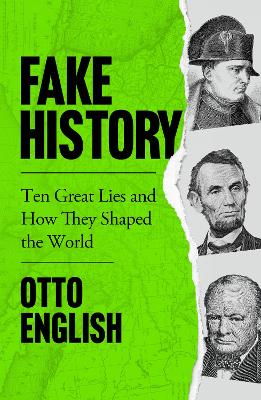Overall, Fake History: Ten Great Lies and How They Shaped the World was an excellently researched and written work of non-fiction. Unfortunately, I feel the audiobook was not the best way to experience it. With that in mind I will talk about what I didn't like about the audiobook, but note that it didn't affect my rating of the book overall.
Fake History: Ten Great Lies and How They Shaped the World is both important and timely. It looks at the stories we tell both on a personal and political level, and how they shape the society in which we live. Essentially, almost everything is built on lies, but it's important not to let a good story get in the way of the truth.
Otto English obviously put a lot of research into writing Fake History: Ten Great Lies and How They Shaped the World, and it shows. At first it seems like a lot of the information might be tangential, but English manages to bring all the threads together to paint a very clear picture. While not everything is quite as revelatory as the title might suggest, there were certain lies that I believed that it was fascinating to learn were not exactly as I had been told.
That said, Fake History: Ten Great Lies and How They Shaped the World does lack nuance at moments. English has a very clear bias in his writing, which was made clearer in his narration in the audiobook. While he is critical of Britain and the Empire, he does not write about it with the same vitriol as he does of other Empires and countries. Churchill is represented as a cunning statesman who used propaganda to his own ends, and yet Hitler is represented as a bumbling nobody who almost accidentally gained power. There is danger in that narrative, which ironically, English points out himself in a later chapter when talking about the Kim dynasty of North Korea, which simply highlights the inherent contradictions of personal bias that I found rather distracting throughout the book.
That said, despite the moments of personal bias, I felt it worked well overall - especially since the subject itself encourages readers to do their own thinking and their own research to counteract it. There is a lot of value in Fake History: Ten Great Lies and How They Shaped the World, and the chapters on family stories and the ultimate conclusion of the book were where it really shone. English cunningly sets the whole book up to showcase the bias that each of us holds. Is there really a difference between the giant statue of a golden dog unveiled in Turkmenistan, and Britain's own statue of Petra, the Blue Peter dog in Manchester? What we perceive as foolish and grandiose in the context of other countries somehow become accepted and normalised in our own. This was a lesson sorely needed, and one that English spends his entire book setting up.
From an audiobook perspective, I didn't find Otto English's narration particularly engaging. And, as a bilingual German speaker I found his butchering of German pronunciation particularly hard to stomach. Hearing him struggle to pronounce German, French, Nahuatl, and other languages was hard on the ears and I do wish a bit more time and effort had been put into learning the correct pronunciations out of respect to the cultural heritages that those languages represent.
Overall, I enjoyed Fake History: Ten Great Lies and How They Shaped the World. It was easy to digest and had something of importance to say. In a world with so much information at our fingertips, it's more and more important to be able to sort the wheat from the chaff, and Otto English's book goes a long way in helping do just that.
Reviewed by pamela on
Reading updates
- 6 August, 2021: Started reading
- 6 August, 2021: on page 0 out of 320
- 13 August, 2021: Finished reading
- 13 August, 2021: Reviewed
